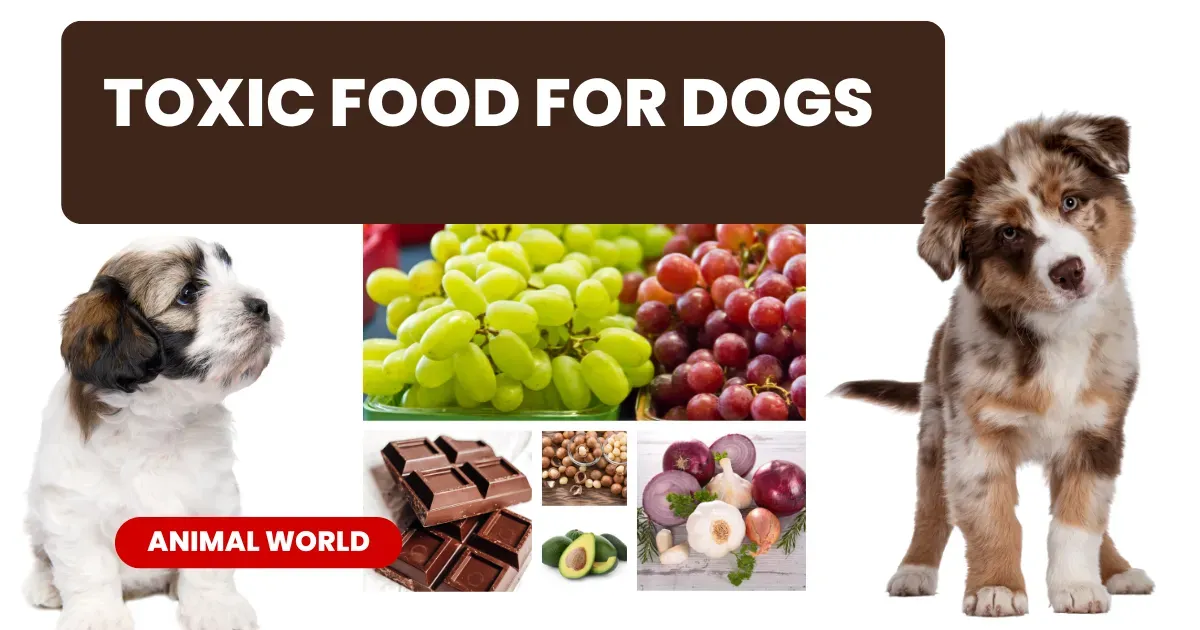Toxic Foods for Dogs: What Every Pet Owner Should Know
As pet owners, it's our responsibility to ensure that our furry friends stay safe and healthy. One of the most critical aspects of pet care is understanding what foods are toxic to dogs. While some human foods are harmless or beneficial for dogs, others can be hazardous and even life-threatening.
ToC
Protect Your Pup: Common Food Dangers
In this guide, we'll explore some of the most common toxic foods for dogs and the potential risks they pose.
Chocolate:
Chocolate is one of the most well-known toxic foods for dogs. It contains theobromine and caffeine, which can cause vomiting, diarrhea, rapid breathing, increased heart rate, seizures, and even death in dogs.The severity of the symptoms depends on the type and amount of chocolate consumed, with dark chocolate and cocoa powder posing the highest risk due to their higher theobromine content. Even small amounts of chocolate can harm dogs, so it is essential to keep all chocolate products out of the reach of pets.
(getButton) #text=(Natural, Healthy Nutrition For Your Pup's Allergies) #icon=(link) #color=(#348498)(getButton) #text=(Steps to Train Your Stubborn Dog) #icon=(link) #color=(#dd2a7b) (getButton) #text=(Don't Give To Your Dog Those Toxic And Deadly Foods) #icon=(link) #color=(#2339bd)(getButton) #text=(Essential Tips to Manage Allergy Triggers in Dogs) #icon=(link) #color=(#8134af)
Grapes and Raisins:
Grapes and raisins are another typical food that can be toxic to dogs. While the exact substance in grapes and raisins that causes toxicity is unknown, even small amounts can lead to kidney failure in dogs.Symptoms of grape or raisin ingestion may include vomiting, diarrhea, lethargy, decreased appetite, and signs of kidney failure, such as increased thirst and urination. To prevent accidental ingestion, it's crucial to avoid feeding dogs grapes or raisins and keep these fruits out of reach.
Xylitol:
Xylitol is a sugar substitute commonly found in sugar-free gum, candies, baked goods, and other products. While safe for humans, xylitol is highly toxic to dogs and can cause a rapid release of insulin, leading to hypoglycemia (low blood sugar). Ingestion of xylitol can also result in liver failure and even death in dogs.Symptoms of xylitol poisoning may include (getButton) #color=(#de1738) #text=(vomiting, lethargy, weakness), seizures, and collapse. It's essential to check ingredient labels carefully and keep products containing xylitol away from pets.
Onions and Garlic:
Onions, garlic, and other members of the allium family contain compounds that can cause oxidative damage to red blood cells in dogs, leading to a condition known as hemolytic anemia. Symptoms of onion or garlic toxicity may include vomiting, diarrhea, abdominal pain, lethargy, weakness, pale gums, and increased heart rate.In severe cases, onion or garlic ingestion can lead to collapse, organ damage, and even death. It's crucial to avoid feeding dogs any foods containing onions, garlic, or onion and garlic powder, including cooked dishes and seasonings.
Alcohol:
Alcohol is highly toxic to dogs and can cause severe poisoning, even in small amounts. Ingestion of alcohol can lead to symptoms such as vomiting, diarrhea, lethargy, disorientation, difficulty breathing, tremors, seizures, and coma. Additionally, alcohol can cause a dangerous drop in blood sugar and body temperature in dogs. It's essential to keep all alcoholic beverages, including beer, wine, and liquor, out of reach of pets and to avoid giving dogs any foods cooked with alcohol.Macadamia Nuts:
Macadamia nuts are highly toxic to dogs and can cause symptoms such as weakness, lethargy, vomiting, tremors, fever, and difficulty walking. In severe cases, ingestion of macadamia nuts can lead to paralysis or even death.The exact mechanism of toxicity is unknown, but even small amounts of macadamia nuts can cause illness in dogs. It's crucial to avoid feeding dogs macadamia nuts and to keep all products containing macadamia nuts out of reach of pets.
Avocado:
While avocado is generally safe for dogs in small amounts, the avocado's fruit, leaves, bark, and pit contain a substance called persin, which can be toxic to dogs in large quantities. Ingestion of avocado may cause symptoms such as vomiting, diarrhea, abdominal pain, and pancreatitis in dogs.Additionally, the giant pit of the avocado poses a choking hazard and can cause an obstruction in the digestive tract if ingested. It's best to avoid feeding dogs avocado altogether and to keep avocado trees and fruit out of reach.
Raw Meat, Eggs, and Bones:
While raw meat, eggs, and bones may seem like natural food choices for dogs, they can pose significant health risks. Raw meat and eggs may contain harmful bacteria such as Salmonella and E. coli, which can cause food poisoning in dogs and humans.Additionally, raw bones can splinter and cause choking, gastrointestinal obstruction, or injury to the mouth, throat, or intestines. It's essential to cook meat and eggs thoroughly before feeding them to dogs and to avoid giving dogs any cooked or raw bones.
Conclusion:
As responsible pet owners, it's crucial to be aware of the foods that are toxic to dogs and take precautions to keep them out of reach. Understanding the risks associated with common toxic foods and being vigilant about what you feed your dog can help protect their health and well-being.If you suspect your dog has ingested a toxic substance, immediately contact your veterinarian or an emergency animal hospital for guidance and treatment.
Prevention is vital to keeping your furry friend safe from food-related hazards.
(getButton) #text=(Natural, Healthy Nutrition For Your Pup's Allergies) #icon=(link) #color=(#348498)(getButton) #text=(Steps to Train Your Stubborn Dog) #icon=(link) #color=(#dd2a7b) (getButton) #text=(Don't Give To Your Dog Those Toxic And Deadly Foods) #icon=(link) #color=(#2339bd)(getButton) #text=(Essential Tips to Manage Allergy Triggers in Dogs) #icon=(link) #color=(#8134af)



.webp)